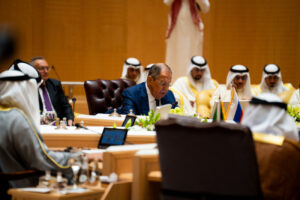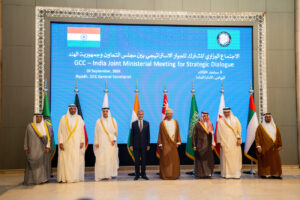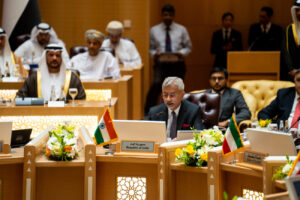





RIYADH: The 161st Ministerial Council meeting of the Gulf Cooperation Council, chaired by Qatari Prime Minister and Minister of Foreign Affairs Sheikh Mohammed bin Abdulrahman Al-Thani and attended by GCC ministers of foreign affairs, was held in Riyadh on Monday.
On the sidelines of the meeting, the GCC held three separate ministerial meetings with Russia, India and Brazil to open new horizons for cooperation.
The seventh GCC-Russia strategic dialogue ministerial meeting was held with Russian Foreign Minister Sergey Lavrov, the GCC-India meeting with Indian Minister of External Affairs Subrahmanyam Jaishankar, and the GCC-Brazil meeting with Brazilian Foreign Minister Mauro Vieira.
Saudi Foreign Minister Prince Faisal bin Farhan and Deputy Foreign Minister Waleed Elkhereiji attended all the meetings.
GCC Secretary-General Jasem Albudaiwi underlined that the joint ministerial meetings aim to strengthen strategic relations with countries and organizations.
Participants examined GCC-Russian relations and explored opportunities to strengthen and expand cooperation. They also discussed the ongoing Russia-Ukraine crisis and the international community’s efforts to achieve a peaceful resolution and support initiatives aimed at ensuring global peace and security.

The meeting emphasized the need for increased coordination on regional and international issues, as well as the importance of multilateral cooperation and stronger economic collaboration to achieve the global Sustainable Development Goals.
Albudaiwi underlined that the meeting is “a continuation of the considerable efforts made by both sides to strengthen friendly relations that fulfill their aspirations, particularly given that this dialogue serves as a permanent platform for discussion at the ministerial level, as it facilitates the exchange of views on key issues of mutual concern, including threats to regional and global security, as well as exploring ways to enhance cooperation in various fields to serve common interests.”
He also reaffirmed the GCC’s solidarity with the Palestinian people, demanding an immediate and permanent ceasefire and an end to military operations by Israel’s occupying forces, and stressing the importance of ensuring access to all humanitarian and relief aid and essential needs for the residents of Gaza, alleviating the suffering of the Palestinian people.
During the first GCC-India meeting, Albudaiwi said that the relations between the GCC countries and India are historical and deep rooted, extending over several centuries and built on foundations of mutual trust and fruitful cooperation, stating that these relations continuously witness significant developments, reflecting the strong will of both parties to enhance the partnership in various fields.

The meeting covered a range of topics, including the joint action plan and ways of bolstering cooperation between the GCC and India. Discussions also focused on reinforcing bilateral and multilateral coordination to enhance international security and peace.
Albudaiwi said: “Today’s meeting will contribute to strengthen the ties between us and open new horizons for joint cooperation, as we stand before a great opportunity to enhance collaboration in the various areas addressed in the memorandum of understanding and to implement the joint action plan that has been reached between the GCC and India for the period (2024-2028).”
In his opening remarks, Jaishankar said: “Our meeting today is not just an occasion to reflect on our achievements but an opportunity to chart an ambitious and far-reaching course for the future.

“The relationship between India and the GCC is rooted in a rich tapestry of history, culture, and shared values. These bonds have grown stronger with time, evolving into partnerships that span economics, energy, defense, technology, education, people-to-people ties, and beyond,” the Indian minister said.
Jaishankar said that the framework to grow GCC-India cooperation details “the three Ps: people, prosperity, progress.” He said that close to nine million Indians live and work in the GCC. “Our interactions are key to driving prosperity in the GCC and in India.”
The Indian minister also emphasized that the GCC is a cornerstone of energy supply.
The meeting discussed several reports regarding the implementation of decisions made by the Supreme Council of the GCC during the 44th summit held in Doha in December 2023. The meeting also reviewed memoranda and reports submitted by the ministerial and technical committees and the GCC General Secretariat, as well as topics related to dialogues and strategic relations between GCC member states and various countries and global blocs.